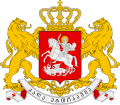 | |
Austria | Georgia |
|---|---|
Foreign relations between Austria and Georgia. Both countries established diplomatic relations in 1992 and Georgia opened its embassy in Vienna in 1996. [1] Austria is represented in Georgia through a non resident ambassador based in Vienna, and through an honorary consulate in Tbilisi. Georgia has an embassy in Vienna and an honorary consulate in Graz. Austria is a member of the European Union, which Georgia applied for in 2022. Both nations are members of the Council of Europe.


